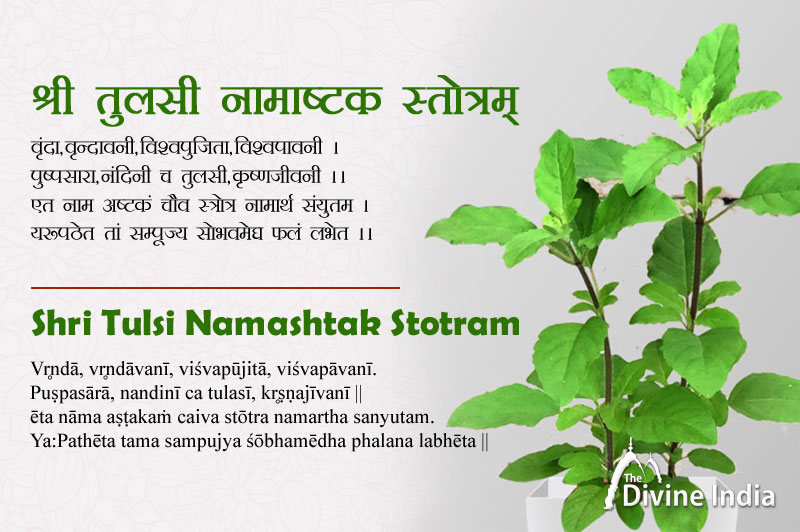


Vr̥ndā, vr̥ndāvanī, viśvapūjitā, viśvapāvanī.
Puṣpasārā, nandinī ca tulasī, kr̥ṣṇajīvanī ||
ēta nāma aṣṭakaṁ caiva stōtra namartha sanyutam.
Ya:Pathēta tama sampujya śōbhamēdha phalana labhēta ||
mahāprasāda jananī, sarvasaubhāgya vardhinī.
Ādhi vyādhi harā nityaṁ, tulasītvaṁ namustutē ||
In the realm of Hindu spirituality, Tulsi, also known as the Holy Basil plant, holds a significant place. It is revered for its divine associations, especially with Lord Krishna. The verses provided, known as the "Tulsi Naam Ashtak," offer profound insights into the various attributes and divine qualities attributed to Tulsi. Let's explore the meanings behind each name:
वृंदा (Vrinda): Vrinda signifies a divine figure or one who is adorned with virtues. Tulsi, being a sacred plant, is considered pure and virtuous, embodying the divine.
वृन्दावनी (Vrindavani): This term denotes the one who resides in Vrindavan. Vrindavan is the transcendental abode of Lord Krishna, and Tulsi's association with this holy place adds to its spiritual significance.
विश्वपुजिता (Vishwapujita): Vishwapujita means worshipped by the world. Tulsi is revered globally for its medicinal properties and spiritual significance, making it a plant honored and worshipped across cultures.
विश्वपावनी (Vishwapavani): Vishwapavani translates to the purifier of the world. Tulsi is believed to have purifying qualities, not just in a physical sense but also spiritually, making it an essential element in Hindu rituals.
पुष्पसारा (Pushpasara): This term signifies the essence of flowers. Tulsi is often associated with the offering of flowers in worship, symbolizing purity, devotion, and the divine connection.
नंदिनी (Nandini): Nandini translates to the delighter. Tulsi is considered a source of joy and delight, bringing positive energy and blessings to those who cultivate and worship it.
तुलसी (Tulsi): Tulsi itself is a name, referring to the Holy Basil plant. It is a symbol of purity, devotion, and auspiciousness in Hinduism.
कृष्णजीवनी (Krishnajivani): Krishnajivani means the life of Krishna. Tulsi is intimately connected with the life and stories of Lord Krishna, making it an integral part of Krishna worship.
The verses further state that reciting this octet or stotra, which encapsulates the various names and meanings of Tulsi, and worshipping Tulsi, bestows auspicious results akin to the blessings showered by clouds. O Tulsi, the Mother of Divine Grace, the bestower of all fortunes, Eradicator of ailments and sorrows forever, I bow to you with reverence.
In essence, the Tulsi Naam Ashtak encapsulates the spiritual essence of Tulsi, portraying it not just as a botanical marvel but as a symbol of divine virtues, purity, and a conduit to connect with the divine energies. Worshipping Tulsi is believed to bring about spiritual elevation, health benefits, and a harmonious life.